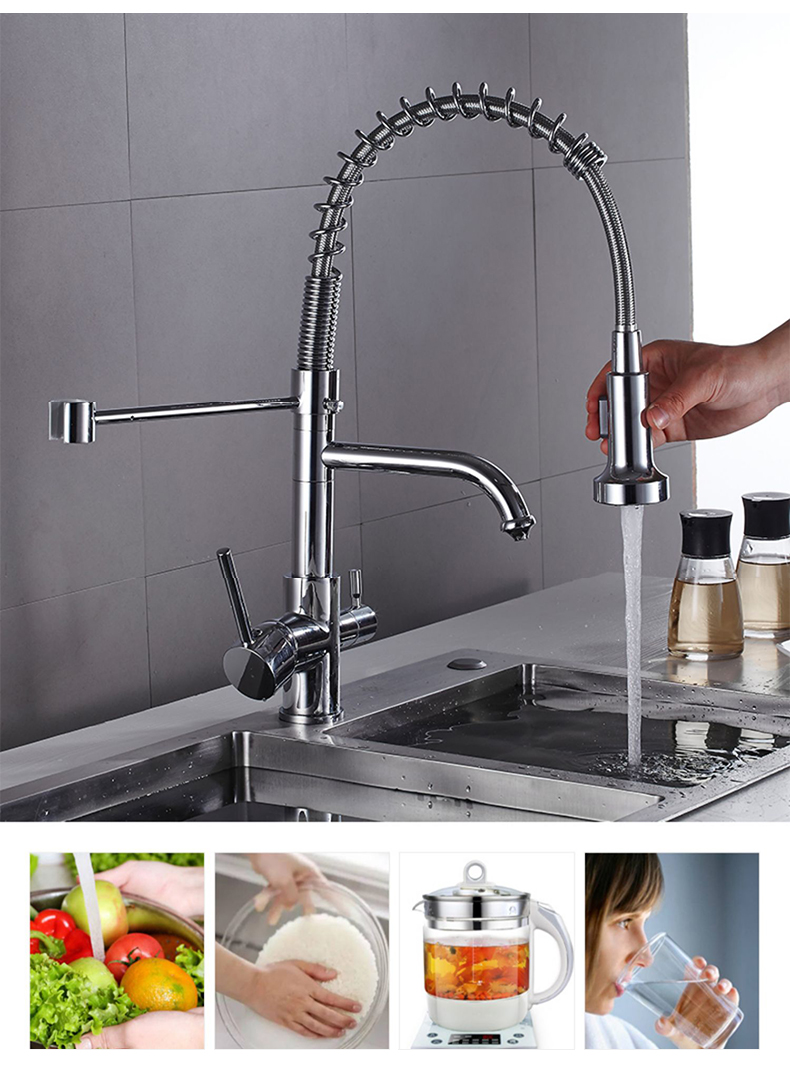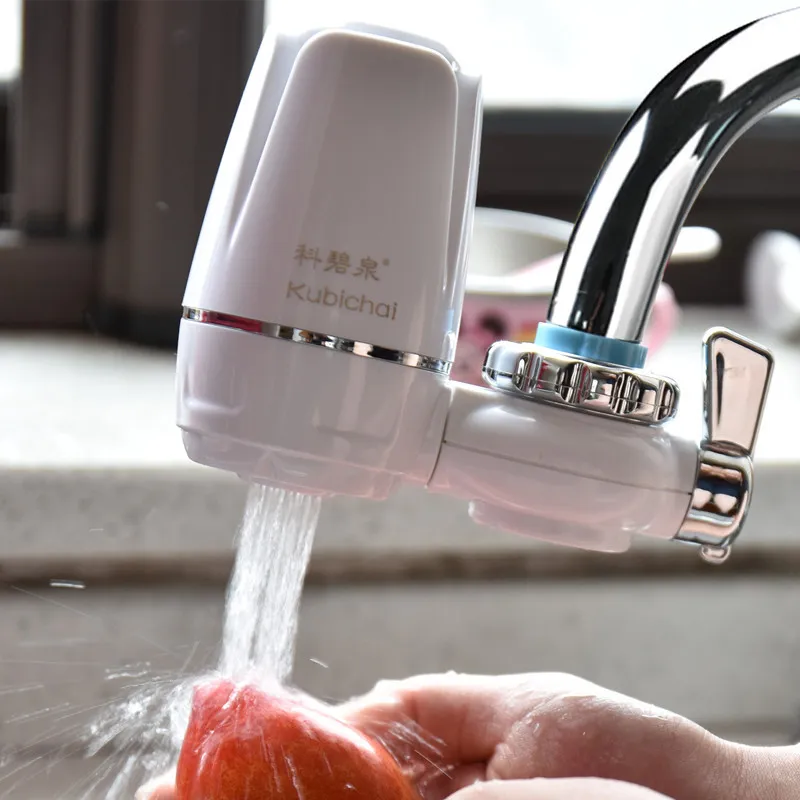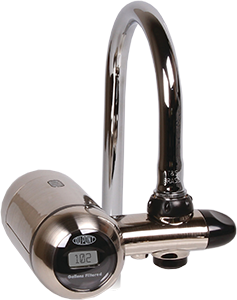A kitchen faucet water filter is an essential device that ensures the water coming from your tap is clean, safe, and pleasant to drink. These filters are designed to remove contaminants such as chlorine, lead, and other impurities that may be present in your water supply. Installing a kitchen faucet water filter can greatly improve the taste and quality of your drinking water, making it healthier for you and your family. One of the primary benefits of using a kitchen faucet water filter is the convenience it offers. Unlike traditional water filtration systems that require separate units or pitchers, a faucet filter is directly attached to your kitchen sink. This means you can access filtered water instantly, without having to wait for a pitcher to filter the water. It’s an efficient and effective way to ensure that every glass of water you drink is clean and safe.
These filters come in various types and sizes, catering to different needs and preferences. Some are simple, single-stage filters that remove basic contaminants, while others are multi-stage systems that can eliminate a wider range of impurities. The choice of filter depends on the quality of your local water supply and your specific needs. For instance, if your water has a high chlorine content, you might opt for a filter that specializes in chlorine removal. On the other hand, if you’re concerned about heavy metals like lead, you’ll need a filter designed to tackle these pollutants.

The installation process for a kitchen faucet water filter is typically straightforward and can be done without professional help. Most filters come with detailed instructions and all the necessary components for installation. The basic steps involve unscrewing the aerator from your faucet, attaching the filter, and ensuring it’s securely in place. Some models might require additional adapters or fittings, but these are usually included in the package. The ease of installation makes these filters a popular choice for many homeowners.
Maintenance of a kitchen faucet water filter is crucial to its performance and longevity. Filters need to be replaced regularly to ensure they continue to effectively remove contaminants. The frequency of replacement varies depending on the model and the amount of water you use. Typically, filters need to be changed every three to six months. Some advanced models come with indicators that alert you when it’s time to replace the filter, taking the guesswork out of maintenance. Regular maintenance ensures that your water remains clean and safe to drink.

In addition to improving the quality of your drinking water, a kitchen faucet water filter can also have a positive impact on your cooking. Using filtered water for cooking can enhance the flavors of your food, as impurities and contaminants that can alter taste are removed. Whether you’re boiling pasta, making soup, or steaming vegetables, using filtered water ensures that the natural flavors of your ingredients are preserved. This is particularly important for those who enjoy cooking and want to ensure the best possible taste for their meals.
Another significant advantage of using a kitchen faucet water filter is its environmental impact. By using a filter, you can significantly reduce your reliance on bottled water. This not only saves you money but also helps to reduce plastic waste. Bottled water contributes to a large amount of plastic pollution, and by using a kitchen faucet filter, you can do your part in minimizing this environmental issue. It’s a small change that can make a big difference in the long run.

Health benefits are another important aspect of using a kitchen faucet water filter. Contaminants in tap water, such as lead and chlorine, can have adverse health effects over time. By removing these impurities, a water filter can help protect your health. This is particularly important for vulnerable populations such as children, pregnant women, and the elderly. Clean, filtered water supports overall health and well-being, ensuring that you’re not ingesting harmful substances with every sip.
The cost-effectiveness of a kitchen faucet water filter is another reason why it’s a worthwhile investment. While the initial cost of the filter and the ongoing expense of replacement cartridges might seem like a considerable outlay, it’s important to compare this to the cost of buying bottled water. Over time, using a faucet filter is much more economical. You’ll save money by not having to purchase bottled water, and the filter will pay for itself in the long run.
Kitchen faucet water filters are also beneficial for the overall plumbing system in your home. Hard water, which contains high levels of minerals like calcium and magnesium, can cause build-up in your pipes and appliances. By using a filter, you can reduce the hardness of your water, thereby prolonging the life of your plumbing system and kitchen appliances. This can save you money on repairs and replacements in the future.
One often overlooked benefit of a kitchen faucet water filter is its impact on personal care. Using filtered water for washing fruits and vegetables ensures that any pesticides or contaminants are rinsed away more effectively. Additionally, using filtered water for tasks like brushing your teeth can contribute to better oral hygiene, as it removes impurities that might otherwise be present in unfiltered tap water.

In terms of versatility, some kitchen faucet water filters offer different settings or modes. For example, you might have a setting for filtered water, another for unfiltered water, and possibly a spray option. This versatility allows you to choose the right type of water for different tasks, conserving the filter’s life for drinking and cooking purposes while using unfiltered water for cleaning.
There’s also the aesthetic aspect to consider. Many modern kitchen faucet water filters are designed to be sleek and stylish, complementing the look of your kitchen. They come in various finishes to match your faucet and other kitchen fixtures. This means you don’t have to compromise on style to enjoy the benefits of clean, filtered water.
Moreover, the technology behind kitchen faucet water filters has advanced significantly over the years. Many models now include features such as electronic indicators, easy-to-change cartridges, and advanced filtration technologies that can remove a wider range of contaminants. This ensures that you have access to the latest innovations in water filtration, providing you with the best possible water quality.
Finally, a kitchen faucet water filter can give you peace of mind. Knowing that the water you and your family are drinking is clean and safe can alleviate concerns about water quality. This is particularly important in areas where water quality is known to be poor or where there have been issues with contamination. A water filter provides an extra layer of security, ensuring that you have access to safe drinking water at all times.

Common Mistakes to Avoid
When using a kitchen faucet water filter, there are some common mistakes that people tend to make. One frequent mistake is neglecting regular maintenance and filter replacement. It’s essential to follow the manufacturer’s guidelines regarding how often the filter should be changed. Failure to replace the filter on time can lead to reduced effectiveness and potentially allow contaminants to pass through.
Another common mistake is improper installation. While many filters are designed for easy installation, it’s crucial to carefully read the instructions and ensure that all components are securely attached. An improperly installed filter may leak or fail to filter the water correctly. Taking the time to double-check the installation can prevent these issues.
Using the wrong type of filter for your water supply is also a mistake to avoid. Not all filters are created equal, and some are designed to target specific contaminants. Conducting a water quality test before purchasing a filter can help you choose the right one for your needs. This ensures that the filter effectively removes the contaminants present in your water.
Overlooking the initial flush of the filter is another mistake. Most filters require an initial flush to remove any loose carbon particles and activate the filtration system. Skipping this step can result in cloudy or impure water initially. Following the manufacturer’s instructions for the initial flush is essential for optimal performance.
Last, not considering the filter’s lifespan and the cost of replacement cartridges can lead to unexpected expenses. When purchasing a kitchen faucet water filter, it’s important to factor in the ongoing cost of replacement filters. Some filters have longer lifespans than others, and choosing one that aligns with your budget and usage can save you money in the long run.

How often should I replace the filter in my kitchen faucet water filter?
The frequency of filter replacement depends on the model and your water usage. Typically, filters need to be changed every three to six months. Some advanced models have indicators that alert you when it’s time to replace the filter. Regular maintenance ensures that your water remains clean and safe to drink.
Can I install a kitchen faucet water filter myself, or do I need a professional?
Most kitchen faucet water filters are designed for easy installation and come with detailed instructions and all necessary components. You can usually install the filter yourself without professional help. However, if you encounter any difficulties, it’s always a good idea to seek assistance to ensure proper installation.
What contaminants do kitchen faucet water filters remove?
Kitchen faucet water filters are designed to remove various contaminants, including chlorine, lead, pesticides, and certain bacteria. The specific contaminants removed depend on the filter’s design and technology. It’s important to choose a filter that targets the contaminants present in your water supply.

How do I know which kitchen faucet water filter is right for me?
To choose the right filter, consider conducting a water quality test to identify the contaminants present in your water. Based on the test results, you can select a filter designed to remove those specific contaminants. Additionally, consider factors such as filter lifespan, cost of replacement cartridges, and ease of installation and maintenance.
Are kitchen faucet water filters environmentally friendly?
Yes, using a kitchen faucet water filter can be environmentally friendly. By reducing your reliance on bottled water, you can help decrease plastic waste and pollution. It’s a sustainable choice that benefits both your health and the environment.
Can using a kitchen faucet water filter improve the taste of my cooking?
Absolutely. Using filtered water for cooking can enhance the flavors of your food. Impurities and contaminants in tap water can alter the taste of your dishes. By using filtered water, you ensure that the natural flavors of your ingredients are preserved, resulting in better-tasting meals.

Related Posts:
- How To Remove Delta Single Handle Kitchen Faucet
- Kohler Kitchen Faucet Repair Instructions
- Polished Nickel Kitchen Faucet
- My Kitchen Faucet Is Leaking
- Kitchen Faucet Aerator Removal
- Baypointe Kitchen Faucet
- Polished Nickel Bridge Kitchen Faucet
- Single Lever Pull Down Kitchen Faucet
- New Kitchen Faucet Drips
- How To Clean Kitchen Faucet Spray Head